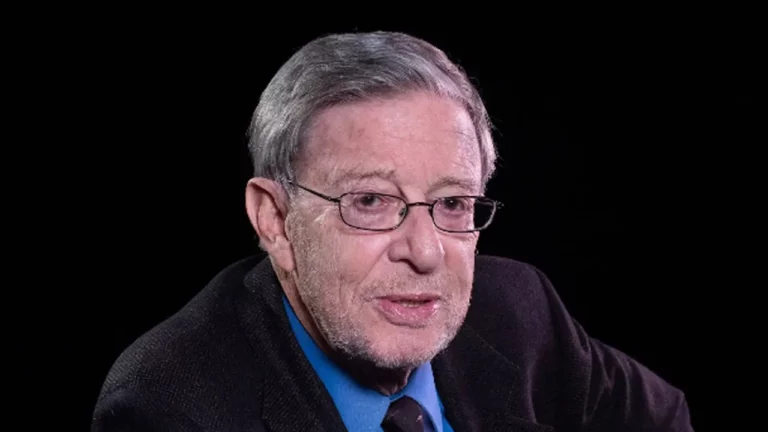Former priest Fox talks about questioning the concept of original sin, the assassination of John Paul I, John Paul II reviving the Inquisition led by Cardinal Ratzinger, and the concept that there is no love without justice – Matthew Fox on Reality Asserts Itself with Paul Jay. This is an episode of Reality Asserts Itself, produced June 10, 2019.
STORY TRANSCRIPT
PAUL JAY: Welcome back to Reality Asserts Itself on The Real News Network. I’m Paul Jay. We’re continuing our discussion with Matthew Fox, who joins us again in Berkeley, California. Thanks for joining us again.
MATTHEW FOX: Thank you, Paul.
PAUL JAY: And just quickly, Matthew is a former Catholic priest who was first stopped from teaching liberation theology and creation spirituality by Cardinal Ratzinger, and was then expelled from the Dominican Order in 1993, where he had belonged there for 34 years. He’s written over three dozen books, including Original Blessing. And that’s part of the story of your becoming in conflict with some of the hierarchy of the Catholic Church.
So we left the story off. You, you’ve been in Paris. You engage with, being influenced by liberation theology, the beginnings of liberation theology. If I understand it through talking with you, the Dominican Order is this sort of subset in the Catholic Church that has its own culture, microculture I guess you could say, but still it’s within the Church, and the Pope is still the Pope. When do you start having- or do you start having doubts and questions about just where the leadership of the Church is taking the Church?
MATTHEW FOX: Well, again, I made my vows when Pope John XXIII was pope. And for me he was a real mensch, was a real human being. And he reached out to non-Christians and nonbelievers, and so forth. And he’s the one who called the Vatican Council. So that spirit of ecumenism, and human beings getting together to get over war and get out of something a little more fruitful. I think that that, his spirit fed that whole movement in the 1960s, and I was on board for that. Absolutely.
And when he died, of course, and Pope Paul VI took over, he in fact was considered quite progressive, et cetera, and in John … Pope John’s mode. But he came up with that encyclical, Humanae Vitae, which shut the door on changing birth control. And that drove a lot of young priests out the door, because they could not in conscience propose that for married couples, and so forth. And of course then you also have liberation theology really taking root in in Latin America in the late ’60s, and base communities, and so forth. And that was important.
Then there was another pope who only lived one month, John Paul I. And he seemed to be really in Pope John XXIII’s spirit. He was very much a person of the people, et cetera. And he died very suddenly. I mean, investigations demonstrate he was murdered. And then-.
PAUL JAY: Did you think so at the time? Because I know a lot of people thought so at the time.
MATTHEW FOX: I did. I thought it was extremely suspicious. Extremely.
PAUL JAY: That he’d been assassinated.
MATTHEW FOX: He’d been assassinated. And there are major books out that demonstrate that, very serious investigations. Then came-
PAUL JAY: Well, before you further-.
MATTHEW FOX: So I didn’t have a problem with these people. I thought they were-.
PAUL JAY: But you said a lot of priests left. And then the Pope was assassinated. Why do you, why do you stick it out?
MATTHEW FOX: Well, I think that there is a lot of potential there. And of course, my field was spirituality. And I was seeing the importance of bringing spirituality to the political issues; of course, the civil rights movement. You know, people forget the civil rights movement came out of the black Church. You know, I think some secularists think it just dropped from no place.
PAUL JAY: And King talks about God all the time.
MATTHEW FOX: Of course. And he was supported by the Church, and all that. And of course, his mentor was a wonderful Howard Thurman, a brilliant African-American mystic. One of the great mystics of North America.
And then, of course, the- then you had the, of course, the women’s movement. And I was teaching for four years in a women’s college. And that really radicalized me as a feminist, because I heard the stories of women. In my family. There was not oppression of women in fact my father sat us all down once at the table. And he said, I can’t afford to send all you kids to college, so here’s the deal. I will send you girls to college, but you boys have to get scholarships. It’s much easier for boys get scholarships than girls. This was the 1950s. So you know, my father, even though he was a Republican, he was also awakened by my mother to the equality of gender. And I just grew up in that context. But of course, a lot of women didn’t.
And so, and then there was the ecological movement. Of course, the gay and lesbian movement, too. All that was happening. And I felt all along that you had to bring spirituality to this to help ground it, because look what happened in the ’60s. You had people, antiwar people, but who ended up floating into drugs and all this. And you know, that doesn’t, that doesn’t get a lot done culturally and politically.
PAUL JAY: And, like, you frame a lot of your discourse politically. What do you mean when you say spirituality? What does that mean?
MATTHEW FOX: Well, for me spirituality is reaching into your depths. It’s working out of your depths, out of your heart, and your head. Not just your head, not just your anger, not just your emotions, but your heart and your head. And so there is, there is discipline involved. And, and of course meditation is important, because it helps us to let go and to have a clearer view of ourselves and our participation. So we’re not just projecting on one another. You know, politics as anger is just reptilian brain, is the word I would use today. But we have to go deeper than the reptilian brain to get things done. We have to deal with with people’s hurt, people’s woundedness, but also our capacity for forgiveness. And I mean, what Gandhi did, or what King did with it in terms of nonviolence, and what Mandela did with it, this is real. These are real political movements that changed things with very little death and violence.
But it takes a change on the inside to be able to deal with violence and be brave enough to, to not respond in kind. And that’s what King was teaching us, and that’s what Gandhi was teaching us. And of course, Gandhi got it from Jesus by way of Tolstoy. So it’s quite a lineage there. He said, I learned to say no from the West. So that prophetic no, that’s a Jewish thing. To say no to injustice. And Marx had that, too. Marx was Jewish. He had no to injustice. And this is what liberation theology was saying, that love and justice are the same words. You can’t separate love from justice. Otherwise love is just a sentimental thing that you see on soap operas. And and justice is the, is kind of the test of love.
So I found all that very attractive, and I felt called to make my modest contribution, whatever that was.
PAUL JAY: The way you’re talking sounds an awful lot like someone who is known as Jesus, except talking that way brought you into real confrontation with the leadership of the Catholic Church, with the Vatican. And you write a book in ’84, is it, called the Original Blessing, which one would think sounds a lot like Jesus. Except it begins a road of you getting kicked out of the church. What is that all about?
MATTHEW FOX: Well, you know, when you stir the pot, it disturbs people. And Jesus disturbed people, and he paid a price. And King stirred people, and he paid a price. And Gandhi, too. So that’s, that’s kind of how the story goes. And that’s the prophetic, the story of the prophets in Israel, too. So life isn’t about surviving. It’s about standing for something, and then the chips fall where they may. You know, what is integrity, you know, if not standing for something, something worth standing for? So you don’t stand alone. You stand with allies of all kinds of movements that echo the principles that Jesus had, and so forth.
Now, my book Original Blessing, it was very disturbing to the Vatican and so forth because in so many ways they’ve built their structure on the idea of original sin. What I proved in my book is Jesus never heard of original sin. It’s not a Jewish idea at all. It’s not in the Bible. It came- the first person to use the phrase was St. Augustine, 4th century, which was the very century where the Church took over the empire. So as I say, if you’re going to run an empire, Original Sin is a great idea, because it gets everyone confused about their right to be here, and about their beauty. And it gets them in line to join the army and kill people in the name of God, or something.
So I came out pretty strong, and I said, look look at, look at the universe. My interest is what I call creation spirituality. Look at nature, look at creation. It’s 13.8 billion years of gifting on the part of, of the original fireball, of the supernovas, of the, of the birth of the solar system, of the sun, of the moon, of the planet. All of this is a blessing. Blessing is just the word for goodness. It’s awful- we’re awful lucky. Things are awful good for us, that the moon’s just the right distance from the earth, et cetera, et cetera. So why don’t we begin talking about the blessing? In fact, the Bible begins, the first page of the Bible goes on and on about goodness, everything is goodness, and then it concludes it’s very good, when humans came along.
Well, the theological word for goodness is blessing. So religion should begin with blessing, not with sin. Sin is human. That’s a human thing. So that’s leaving out 13.7 billion years of the unfolding of God’s work, if you will, to begin with sin. It’s so anthropocentric, or narcissistic, to use Pope Francis’ very, very apt phrase, our narcissism as a species. Religion cannot be healthy if it begins with narcissism.
And then if you go into original sin it’s bad politics, because it makes people victims, and it doesn’t empower. It’s bad psychology. And as I proved, it’s bad theology. Is it’s not what Jesus ever heard of in his life. Eli Weisel actually says that original sin is not only not in the Bible, it’s alien to Jewish thinking. Alien. Well, that’s an amazing thing coming from a Jew, because Jesus was a Jew. So the idea of original sin is alien to Jesus. Well, I think this was too much for the two popes who condemned my work. They called my work, quote, “dangerous and deviant.” Unquote.
PAUL JAY: This is JP II.
PAUL JAY: JP II and Ratzinger.
PAUL JAY: Cardinal Ratzinger, who essentially led the inquisition for JP II.
MATTHEW FOX: That’s right. JP II brought back the Inquisition, because they silenced 108 theologians, of which I’m one. That’s like- think about, that’s like General Motors silence- you know, shutting down all their engineers. Go home, we don’t need you. You know, what’s next? Well, I’ll tell you what’s next. Pedophilia is next. Because you got a lot of stupid people taking over. Only yes men get, have been ordained bishops for the last 35 years.
Now, this new Pope is, is choosing better people. But for 34 years, under those previous two popes, you had nothing but yes men. That was the only quality, really, to become a bishop. And so this is what you get. You get a dumbed-down Church. And you get the young people stumbling over each other to leave.
PAUL JAY: The pope that you were saying was assassinated. There’s a lot of people have speculated that, one, the CIA might have been involved in the assassination, and they also might have been involved in the choice of JP II.
MATTHEW FOX: Well, I’ll tell you this-.
PAUL JAY: Because they want to bring down the Polish government.
MATTHEW FOX: This is a true story. When- shortly after Reagan was inaugurated in March, that’s, what, month or two later there was a big meeting of the National Security Agency, or council, in Santa Fe, New Mexico. And they had one question: How could we destroy liberation theology in Latin America? And they went on for, I don’t remember, 10 days or something. And this was their conclusion: We cannot kill it, but we can split the Church. And then they went after the Pope and said, we’ll give you this money for solidarity in Poland if you kill- you know, go after liberation theology in South America.
And the the CIA agent, the CIA head, he was Opus Dei Catholic. Far right-wing guy. He personally made 29 trips to the Vatican with satchels full of cash. This is proven. I have the footnotes on this in my book, The Pope’s War. And so there’s a quid pro quo. And they got what they wanted. Solidarity became stronger. And you know, eventually the Polish government [crosstalk]
PAUL JAY: Well, certainly the Americans wanted the fall, the success of solidarity, as well. So it wasn’t something they didn’t want.
MATTHEW FOX: That’s right. But they, but they, they wanted that. And they also wanted the destruction of liberation theology in South America. And they got both.
PAUL JAY: So you write the Original Blessing, which goes after this concept of original sin as the fundamental foundation really of much of what the Catholic Church preaches. And I guess if you have original sin you need priests and the church to keep absolving you all the time. And you got to keep paying for this absolution, I suppose. You give money every Sunday after you sit in confession and you get absolved of your piece of original sin. And you go after that. And so you’re going after a fundamental. And you’re also going after the Pope, which is, who is supposed to be beyond doubt.
MATTHEW FOX: Well, I’m just trying to bring back awareness of what a gift it is to exist. The more science tells us about existence, how rare this planet is and how now we live in a world with two trillion galaxies, each with hundreds of billions of stars, is just an amazing existence. And we should begin religion with awe and wonder and gratitude, and not with with human sin, because the humans are not the be all and end all of the universe. Thomas Aquinas said that in the 13th century. He said the most excellent thing in the universe is not the human. The most excellent thing the universe is the universe itself. And that was before we know what we know about how amazing the universe is.
But that’s the tradition. See, what I’ve drawn- I didn’t make this stuff up. I found this, this teaching in some of our greatest mystics and thinkers and theologians in history, in our own history. And with this consciousness, then you can also begin to work with people of other traditions. With Buddhists, for example, who talk about original purity, for example. But also even in Christianity, the Eastern Christians never paid attention to St. Augustine. They don’t believe in original sin. They believe in theosis, which means divinizing the universe. We’re not here to be redeemed from sin. We’re here to divinize the universe. That’s their, their language.
PAUL JAY: But with that book you’re not just having a philosophical debate about the original blessing versus original sin. You’re de facto saying the pope’s not infallible.
MATTHEW FOX: Well, first of all, the papacy has never defined original sin, which is part of the problem here. So everyone can project their thing on it. It’s like a Rorshach test. So for a person of color, original sin might be that you’re a person of color. For a gay person, it might mean that you’re gay. For a woman it’s that you’re a woman. So it just invites all kinds of self-abuse, really. And that’s why it’s so dangerous psychologically. Again-
PAUL JAY: What I’m saying is when you write that book you know you’re doing a direct- you’re directly confronting an important piece of the belief system. But you’re directly confronting the Pope.
MATTHEW FOX: Well, you know, I, I write in search of truth. I don’t- I’m not looking for some superego in the sky named the Pope to tell you what’s right and wrong. You know, I did my own homework. And it’s never been questioned, frankly, by other theologians. Since I wrote that a lot of people have come on board.
So, so it was- what I really did was to identify, I think, in that language- you know, it was strong language insofar as it catches people. Original sin, original blessing. In fact, Otto Rank, who’s Jewish and not Christian, he talks about original wounds. He says we were born with an original wound. And I like that language much better than original sin. And of course, we are born into a sinful world. I mean, think of the people being born today in the world of Trump, or in the world of the collapse of the ecosystem as we know it, and so forth. So there’s plenty of sin we’re born into. But it’s not our fault. And new parents know that their, their new beings that they bring into the world are beautiful and awesome and all this.
So where does all this come from? It comes from a very neurotic theologian in the 4th century named St. Augustine. And he identifies the original sin with sexuality. And that, that’s important. Because if you’re going to understand the, for example, the pedophile crisis and other issues- and of course, the pedophile crisis is not just a religious problem, when they find it’s at Michigan State, it’s at Ohio State, and the football teams and then wrestling teams and all that. I mean, it’s a human problem. And we ought to all be talking about it, what we can do about it.
But nevertheless, I think that the church has had such a shadow-filled teaching about sexuality, including forbidding birth control, and at a time when we’ve already got seven billion humans on the planet, that you know, that’s part of the, of the weight, the gravity of the teaching of original sin.
PAUL JAY: OK. In the next segment we’ll continue the discussion about the original sin, sexuality, and how Matthew’s book leads to another Inquisition, and he’s the target of it. Please join us on Reality Asserts Itself on The Real News Network.






